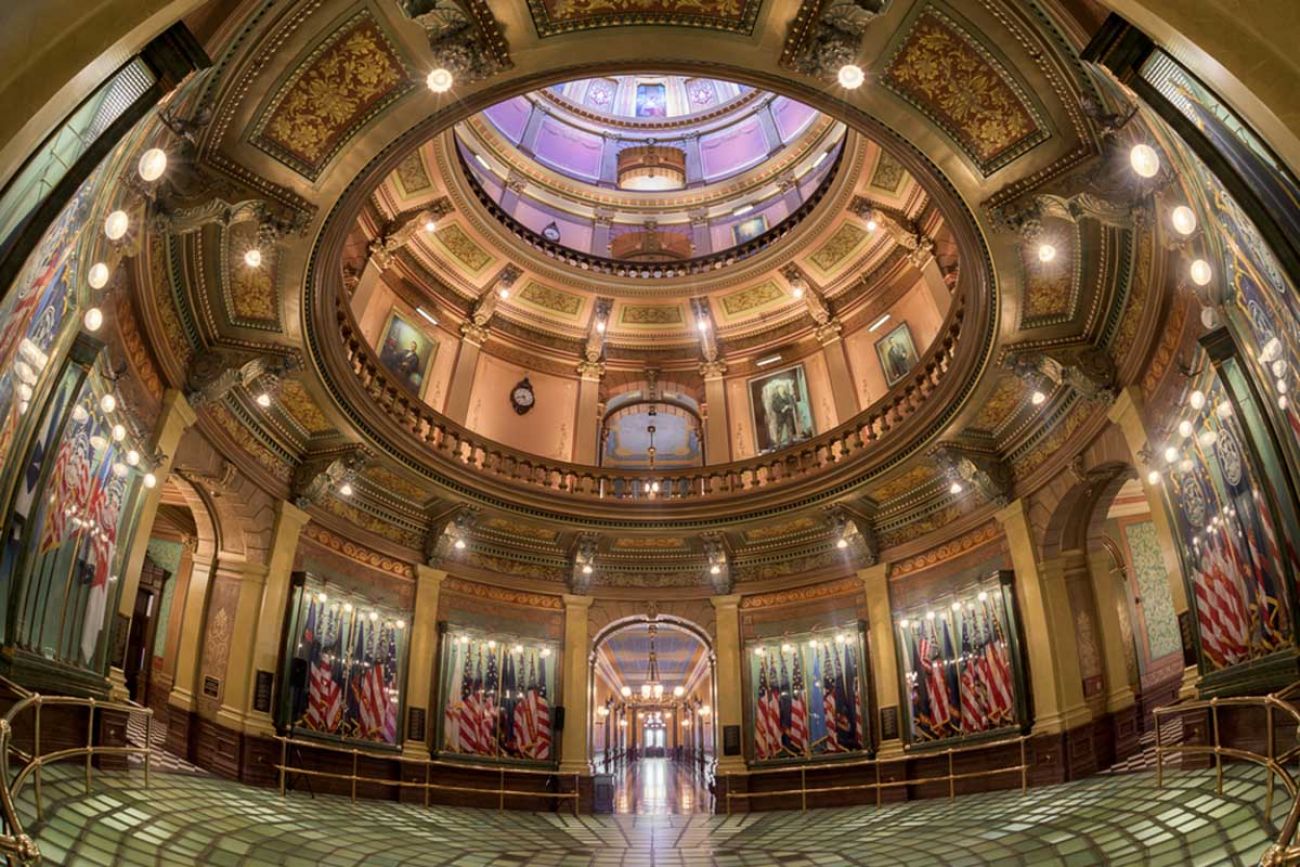Whitmer, GOP leaders ditch transparency on budget for secret COVID deal

LANSING—Six months into a pandemic that has limited public access to government meetings and slowed responses to public records requests, Michigan lawmakers could vote as soon as Wednesday on a roughly $60 billion budget bill that few had seen 24 hours prior.
Democratic Gov. Gretchen Whitmer and Republican legislative leaders have framed budget transparency as a bipartisan victim of COVID-19, which has slowed state tax collections and will require corresponding spending cuts by Oct. 1, as mandated by the Michigan Constitution.
But good government advocates say the secretive process is the latest in a series of troubling developments involving the governor, who campaigned on a pledge of transparency but has not always followed through. Her administration was slow to release public data on COVID-19 deaths in nursing homes, has not disclosed numbers at other long-term senior care facilities, and only recently began reporting weekly data on outbreaks in K-12 schools and colleges.
Related stories:
- Schools, local governments spared from cuts under Michigan budget deal
- Gretchen Whitmer, Republicans strike deal to plug $2.2B Michigan budget hole
GOP leaders and business groups, meanwhile, complain Whitmer has been secretive about the metrics used by her administration to inform her emergency orders.
The budget secrecy is “crazy,” said Lisa McGraw, legislative affairs director for the Michigan Press Association, part of a coalition of more than 30 news and government transparency groups urging Whitmer to disclose school outbreak data more frequently than once a week. (Bridge Michigan, BridgeDetroit and the Center for Michigan are part of the coalition.)
“I think we’re past the point where we can blame things on COVID,” McGraw said. “It’s been months. We know how to behave now. Let’s get the information out there.”
Developing the state budget typically takes months, starting with a proposal from the governor, followed by competing proposals from the House and Senate, public vetting in subcommittees, full appropriations committees and floor debates prior to negotiations on final details.
This year, Whitmer proposed a $61.9 billion budget in February, but the pandemic upended that plan. The budget deal set for a vote this week, was negotiated entirely behind closed doors with GOP legislative leaders. As of Tuesday morning, few lawmakers had even seen the plan in detail.
“Negotiations with the Michigan Legislature have been productive, however, the executive branch does not control the legislative process,” said Whitmer spokesperson Tiffany Brown.
Legislative leaders and Whitmer Budget Director Chris Kolb last week announced they’d reached bipartisan agreement on a framework that would spare K-12 schools and local governments from any cuts. But they’ve said little else since.
The process has left taxpayers and policy groups in the dark on the looming state budget, a physical document detailing state priorities. It’s passage is arguably the most important role the Michigan Legislature plays each year.
“Not much about the timing of this has gone the way anyone would choose,” Gideon D’Assandro, a spokesperson for House Speaker Lee Chatfield, R-Levering, told Bridge Michigan on Tuesday morning. But a vote in the lower chamber is likely Wednesday, he said.
“The important thing was solving the shortfall left by COVID and reaching a bipartisan agreement to fund critical services, like schools, public safety, and healthcare supplies for frontline workers before the deadline,” he said. “This budget does all of that.”
The pandemic, federal assistance and fluctuating revenue estimates have “all contributed to a budget year unlike any in recent history,” added Amber McCann, spokesperson for Senate Majority Leader Mike Shirkey, R-Clarklake.
‘We don’t know’
A source familiar with the budget deal said it will likely utilize a remaining balance in the state’s School Aid Fund to provide school districts with the equivalent of an extra $50 to $60 per pupil for the fiscal year that begins in October. It’s also expected to include extra money for school districts that have taken on new transfer students amid the pandemic.
But details of the spending plan, including any programming cuts for major state departments that oversee public health and the environment, are not known. And the implications for Michigan taxpayers, who ultimately foot the bill, are not immediately clear.
“That’s the thing about transparency, or lack thereof: We don’t know,” said Michael LaFaive, a senior director at the free-market Mackinac Center for Public Policy. “Things could work out very well, or they could work out with many surprises.”
While the budget process is unique, that does not mean there is any “particularly nefarious motivation here,” said Ken Sikkema, a Republican and former state Senate leader who is now a senior policy fellow for Public Sector Consultants in Lansing.
With revenues in flux and uncertainty over whether the federal government would provide states additional aid, there would have been “no particular value in having subcommittee or committee hearings in July or even August,” Sikkema said.
Republicans who control the Legislature have blasted Whitmer for not providing more data to explain her COVID-19 orders, but Sikkema said leaders likely have their own motivation for keeping the budget negotiations under wraps given likely spending cuts: If there’s no public plan, interest groups can’t lobby lawmakers to restore funding.
“When you’re dealing with controversial issues, and you’re concerned about marshaling 20 votes in the Senate and 56 in the House, any hemorrhaging of votes is a problem,” Sikkema said.
“From purely a political standpoint, the less time available for the deal to be scuttled, the better off you are, because there’s always going to be people or interest groups that are not going to be happy.”
There may also be election year politics at play, said Craig Thiel, research director for the Citizens Research Council. Instead of forcing lawmakers to debate specific cuts ahead of the Nov. 3 election, leadership appears poised to only ask them to vote up or down on the total package that will protect popular school funding.
“I’ve seen all types of machinations on budgets being put together under divided government and unified government, and I have never seen anything quite like this,” said Thiel, who previously worked for both the House and Senate fiscal agencies.
“It does smack a little bit of the way the federal government works some time, when these massive bills get dumped on people's desk hours before the vote.”
Transparency pledge
The pending vote on the secret state budget comes just one week after transparency advocates celebrated a milestone in the Michigan Legislature. For the first time, a Senate committee held a public hearing on a long-debate proposal that would subject both the Legislature and governor’s office to public records requests.
Michigan is one of only two states that exempt lawmakers and the governor from its public records law known as the Freedom of Information Act (FOIA), a distinction that has helped it earn a failing grade for ethics and transparency from a national governmental watchdog. The bipartisan legislation, as approved early last year by the GOP-led House, would create a new Legislative Open Records Act.
As a candidate in 2018, Whitmer unveiled a broad government transparency plan that, among other things, proposed expanding FOIA, toughening lobbying rules and requiring all state boards and commissions to livestream their meetings.
“If the Legislature won’t act, I will use the governor’s authority under the Michigan State Constitution to extend FOIA to the Lieutenant Governor and Governor’s Offices,” Whitmer stated in a campaign policy document.
Nearly two years into her term, the governor has not followed through. Her office noted that early last year she did use executive powers to try and speed up record request responses by state departments. But then in early April, she issued an emergency order that temporarily gave government agencies more time to respond to FOIA requests during COVID-19.
Last week’s hearing on the FOIA expansion package may have been largely symbolic, however, because the top Republican in the Senate has raised concerns and has not committed to holding a vote. Instead, Shirkey has called for additional discussion over technological advances and said he wants to ensure personal communications are not subject to requests.
“I think it would have a good shot if it actually went to the floor for a vote, but that remains to be seen,” said McGraw, of the state press association. “Show me the vote. That’s what I want. And then we’ll see what our good governor does when it gets to her.”
The Whitmer administration sought changes to the public records package last year before the House vote, including carving out exemptions that would shield information about the governor’s official residence and discussions over potential gubernatorial pardons for convicted felons, McGraw said.
Whitmer’s office is still “reviewing the legislation,” Brown, the governor’s spokesperson, said Tuesday. “The governor supports greater transparency in state government, which is why she became the first governor in Michigan history to voluntarily post her income taxes, personal financial information, and official schedule on” a state “sunshine” website.
While most states subject state officials to their Freedom of Information Act, Michigan lawmakers like Shirkey have legitimate concerns about balancing transparency with legislative effectiveness, said Sikkema.They fear that “having everything all the time completely out in the open” could expose blunt conversations sometimes needed to finalize legislation.
“I think honestly that’s been the fundamental roadblock,” Sikkema said. “It hasn’t been just about trying to hide something, per se, it’s been more, can you maintain effective governance in that kind of an environment?”
Data debate
The budget deal, however secretive, is a notable sign of bipartisanship in Lansing. Whitmer and GOP leaders went to war over the budget last year, nearly shutting down state government and prompting a historic veto spree by the first-term governor that took months to resolve.
Tensions have only escalated in recent months as lawmakers sued Whitmer over the emergency authority she has exercised during COVID-19, accused her health department of “stonewalling” a legislative inquiry into nursing home policy and repeatedly questioned the underlying data she is using to inform her pandemic response.
“Government is holding citizens accountable to comply with its mandates without citizens knowing the data and info that drives those mandates,” Shirkey said last month. “We need transparency from Governor Whitmer on how she is making her decisions. We need her to share clear benchmarks, that when met, restore our rights.”
Whitmer has maintained that her orders are based on science and data -- and “it is working,” Brown, her spokeswoman, said Tuesday.
“If you look at the other states, you can see that Michigan is faring better than all of them because we took aggressive action in this fight. Going forward, we will continue to work with health experts to assess the risk associated with business sectors that remain closed. For the health and safety of our families and frontline workers, it is crucial that we proceed thoughtfully and incrementally so we can measure the effects of today's actions before we take additional steps towards re-engagement.”
But those “trust us” statements are wearing thin, said Macomb County Executive Mark Hackel, a moderate Democrat who has challenged Whitmer to explain ongoing restrictions more thoroughly. Hackel told Bridge Tuesday he does not understand why restaurants and bars – which have been linked to COVID-19 cases across the state – were allowed to re-open months ago while businesses such as indoor banquet centers and movie theaters in his county remain closed.
“Don’t tell me it’s the data and the science when they don’t coincide,” Hackel said, noting the governor has not always followed her own economic restart plan. “It’s something else, and I have to say, it’s arbitrary.”
Whitmer has done a “pretty good job of managing through COVID,” said Sikkema, the former GOP leader, but by cutting the Legislature out of the decision-making process she has also limited input and public debate over her orders.
“Transparency comes back if you have a checks and balances system,” he said, noting public policy is typically debated in legislative committee hearings. “Transparency automatically increases, so I think that’s the cure here.”
Transparency advocates continue to push Whitmer to increase public reporting on COVID-19 outbreaks at schools and colleges. The administration began publishing building-level data last week, but the numbers are released only once a week and therefore lag.
“We don’t feel that once a week is sufficient notification,” McGraw said “It’s not good transparency, and it kind of goes against what the administration talks about all the time, which is tracing and tracking. It’s hard to do that when people are only finding out once a week that this happened. If I had a kid in school right now, I wouldn’t be pleased.”
Real-time reporting on school outbreaks could actually help the state’s public health response by complementing contact tracing efforts, McGraw argued. “We can’t keep using COVID as an excuse when we’re trying to keep people informed about COVID.”
See what new members are saying about why they donated to Bridge Michigan:
- “In order for this information to be accurate and unbiased it must be underwritten by its readers, not by special interests.” - Larry S.
- “Not many other media sources report on the topics Bridge does.” - Susan B.
- “Your journalism is outstanding and rare these days.” - Mark S.
If you want to ensure the future of nonpartisan, nonprofit Michigan journalism, please become a member today. You, too, will be asked why you donated and maybe we'll feature your quote next time!




